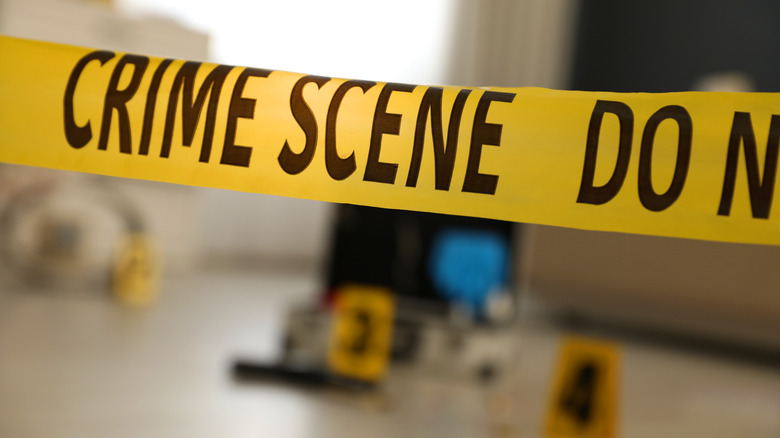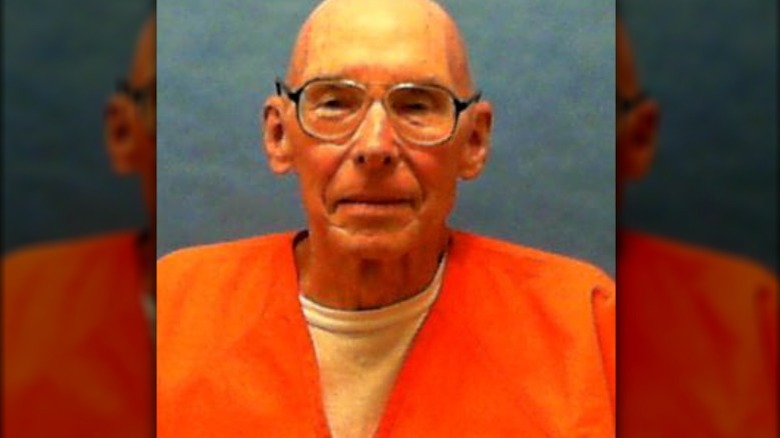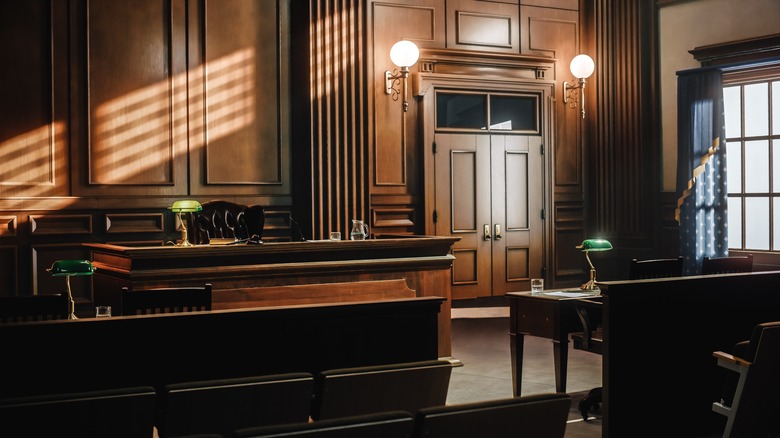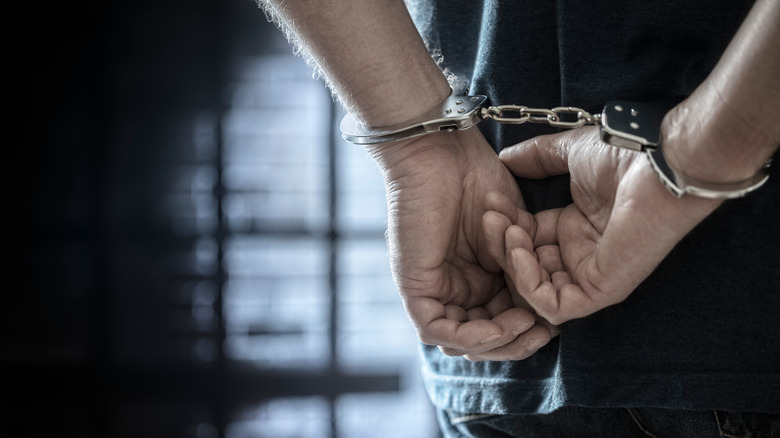The Controversial Case Of Convicted Murderer Tommy Zeigler
The crime scene at the W.T. Zeigler Furniture store in Winter Garden, Florida, on Christmas Eve of 1975, was incredibly complex. There were multiple victims spread out across the vast space, several weapons found at the scene, and bloody footprints everywhere, according to the book "Monsters of Death Row: America's Dead Men and Women Walking" by Christopher Berry-Dee.
The only person left alive was the store's owner, William Thomas "Tommy" Zeigler. His wife, Eunice; her parents, Virginia and Perry Edwards; and a customer named Charlie Mays had all been shot to death, and the two men had also been bludgeoned, according to the Orlando Sentinel. Tommy Zeigler had also been shot once in the abdomen, the bullet missing his liver by mere millimeters, per "Monsters of Death Row." The Orange County Sheriff's Office honed in on the only surviving apparent victim and soon charged him with all four murders. For nearly 50 years, Zeigler has maintained his innocence and continues to pursue his vindication while he sits on death row.
The Case Against Tommy Zeigler
Tommy Zeigler, 30 years old at the time, alleged that a group of men broke into the store that night; that Chalie Mays, who was found among the dead at the scene, had been in on it; and that they had shot and bludgeoned his wife and her parents to death, according to the Orlando Sentinel. Zeigler told investigators he fought with the men before being shot during the struggle and returning fire.
This was the first big case for the lead investigator, Donald Frye, and while the crime scene was complicated, he quickly determined it was a simple case, according to "Monsters of Death Row." Frye believed Zeigler murdered his wife for the insurance money — the equivalent of about $2.75 million today — and shot himself to cover his tracks, per the book. The case was based on circumstantial evidence, including that all eight guns at the crime scene were allegedly tied to Zeigler, per the Orlando Sentinel. The investigator's argument relied heavily on one witness. Edward Williams, one of Zeigler's workers, claimed Zeigler had tried to drag him into the store at gunpoint after the murders but that the gun misfired, and he convinced Zeigler to hand over the pistol, per the Miami Herald. Zeigler alleged Williams was lying and in on the plot to rob the store.
Trials and Tribulations
Six months after the murders, Tommy Zeigler went to trial. In July 1976, an Orange County, Florida jury found him guilty of the murders but asked that the court sentence him to life in prison, according to the Miami Herald. The judge in the case, Maurice Paul, overrode the jury's wishes and ordered Zeigler to be put to death in the electric chair. One juror ran out of the courtroom crying when she heard the judge's decision, per the Miami Herald. The judge had appeared to side with the prosecution in the case, and six jurors who originally wanted to acquit were persuaded to convict him, per "Monsters of Death Row."
One of the key pieces of evidence was a blood stain under the arm of Tommy Zeigler's shirt that the prosecution alleged belonged to his father-in-law, Perry Edwards, and had gotten there when the defendant put the other man in a headlock while bludgeoning him, according to the Orlando Sentinel. Later DNA testing showed the blood had actually come from the dead customer, Charlie Mays, who Zeigler said he fought that night. One of the original jurors, Peggy Dollinger, told the Orlando Sentinel that had she known that the blood on Zeigler's shirt hadn't come from the father-in-law, it would have made a difference.
A Growing List of People Who Believe Tommy Zeigler is Innocent
Following Tommy Zeigler's conviction, he continued fighting not only to stay alive but to prove his innocence. He avoided his scheduled execution twice, in 1982 and 1986, according to the Tampa Bay Times. In 1982, a federal judge stayed the execution while Zeigler's attorneys sought a new trial, per the Orlando Sentinel. In 1986, the federal court again intervened, staying Zeigler's execution because his attorneys had inadequately represented him, per the Orlando Sentinel. He later had his sentence overturned, only to be resentenced to death, per the Florida Supreme Court.
Zeigler remains convicted of the murders and on death row. Meanwhile, a growing number of people across the globe, from clergy to journalists, believe Zeigler is innocent, per the Florida Catholic. Among them is Leigh MacEachern, the former Chief Deputy of the Orange County Sheriff's Office, which investigated the crimes, according to "Monsters of Death Row." There is now a Facebook group and a website dedicated to trying to prove Zeigler's innocence that can be found on the internet — a technology that did not exist at the time of the murders. Zeigler is also hoping to expand the use of another form of technology that didn't exist back in 1975 to help prove his innocence.
Could Advanced DNA Testing Prove His Innocence?
Tommy Zeigler fought for years to be allowed to use DNA testing on the evidence from the case and was denied at least six times, according to the Tampa Bay Times. In 2001, he was granted a limited amount of DNA testing, which proved the blood on his shirt belonged to the customer, Charlie Mays, but Judge Reginald Whitehead disallowed a new trial, finding that this didn't prove Mays had been the perpetrator, per the Orlando Sentinel. The 2001 DNA testing also found that Mays' shirt had the blood of Zeigler's father-in-law on it, per the Miami Herald.
Since 1989, the first time a wrongly convicted person had their case overturned through DNA evidence, there have been 375 cases — 21 involving death row cases — in which this forensic technique has helped remedy these injustices in the U.S., according to the Innocence Project, a non-profit dedicated to criminal justice reform. But in Zeigler's case, the latest roadblock to DNA testing has been Florida's Attorney General Ashley Moody, per the Tampa Bay Times.
The Case Continues
Tommy Zeigler, now 77, has spent more time on death row than he has in the outside world. He even beat a bout of COVID-19 in 2020 when it raged through the state's prisons, according to the Florida Catholic. In May 2021, a state prosecutor agreed to allow Zeigler's attorneys to test the crime-scene evidence using the more advanced DNA testing not available back in 2001. The next month, State Attorney General Ashley Moody fought the move because the defense attorneys hadn't gone through her office.
In October 2021, the Florida State Supreme Court unanimously denied the Attorney General's Office the right to prevent DNA testing in a similar case to Zeigler's, which should open up the way for his attorneys to get the new testing done, per the Death Penalty Information Center. "Nothing is never easy in this case," Zeigler wrote in an email to the Florida Catholic in August 2021. "I am confident that we will win this and get the DNA testing!"





